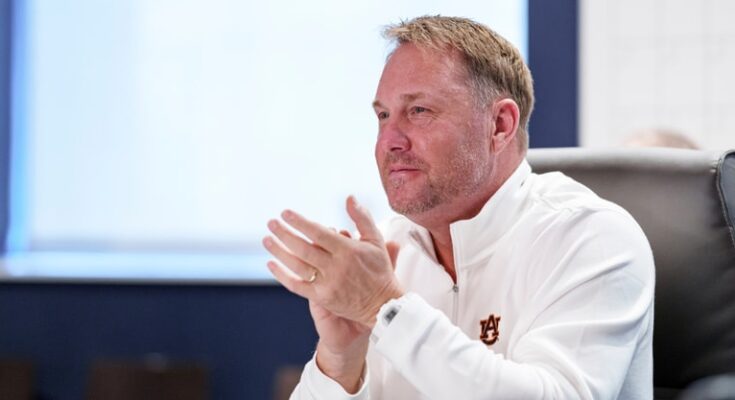Hugh Freeze, the head football coach at Auburn University, has never been one to shy away from adversity. Throughout his coaching career, he has faced challenges on and off the field, but none as personal or daunting as the battle he now faces with prostate cancer. In early 2025, Freeze publicly revealed that he had been diagnosed with prostate cancer, a moment that stunned many in the college football community and prompted a wave of support and concern. What followed was not just a story about illness, but one of resilience, faith, and determination. As he continues to lead the Auburn Tigers into a new season, Freeze has been open and honest about where he stands in his fight and what it has meant for his life, his family, and his team.
When Freeze received the diagnosis, it came as a shock. By all appearances, he was in good health. He was physically active, committed to his work, and mentally sharp. There were no symptoms, no warnings, no clear signs that something was wrong. The diagnosis came after routine medical testing revealed an elevated PSA level, prompting further investigation. A biopsy confirmed the presence of prostate cancer, and while the doctors assured him it was caught early and was treatable, the news hit him hard. Freeze admitted that he initially struggled to process it. He felt disbelief, even anger, questioning how something so serious could be happening when he felt perfectly fine. For someone used to being in control, the uncertainty of cancer was a jarring new reality.
Despite the initial shock, Freeze made a conscious decision to shift his mindset. After allowing himself a brief period of self-pity, he embraced the situation with the same intensity and purpose that he brings to football. He leaned on his faith, his family, and the support of his coaching staff and players. His wife, Jill, became his closest confidante during those early days, and together they navigated the emotional and practical complexities of the diagnosis. Freeze spoke about how their relationship deepened through this experience. They prayed together, discussed treatment options, and made a commitment to face this challenge head-on. He also reflected on the blessing of their grandchildren, including one more on the way, and how the diagnosis reminded him to cherish every moment with those he loves.
One of the most important decisions Freeze faced early on was how to handle the cancer in the context of his coaching responsibilities. With the 2025 season approaching, he had to consider whether to begin immediate treatment or pursue a watch-and-wait approach. After consulting with specialists, he learned that his cancer was a slow-growing form, classified as an early-stage and manageable case. The doctors recommended active surveillance, meaning frequent monitoring through PSA tests and imaging, with the understanding that more aggressive treatment could be initiated later if necessary. This gave Freeze and his family some breathing room. It also allowed him to remain fully committed to coaching Auburn for the upcoming season without the immediate physical toll of surgery or radiation.
The emotional toll, however, was real. Freeze has been candid about how difficult it was to reconcile his outward strength with the knowledge that cancer was inside his body. He said he struggled with the idea of feeling fine while knowing something serious was wrong. Yet, rather than allowing those feelings to consume him, he used them as fuel. He approached his team with honesty, telling his players what he was facing and how he planned to deal with it. His transparency resonated deeply with them. In a world where toughness is often measured by how well you can hide pain, Freeze demonstrated that true strength can also come from vulnerability. He wanted to be a living example of what it means to face adversity with courage and grace.
Freeze’s approach to managing the cancer has been methodical and grounded in faith. He continues to undergo regular PSA tests, and his medical team monitors any changes closely. Recently, he shared that his PSA levels have been declining, a positive sign that the cancer is not advancing aggressively. While he acknowledges that there are no guarantees, he remains optimistic. His doctors believe that delaying definitive treatment until after the 2025 season is a safe and reasonable plan. That gives Freeze the chance to stay focused on his team while keeping his health a top priority. He plans to revisit treatment options, including potential surgery, in January 2026, depending on how his condition evolves over the next several months.
Throughout this process, Freeze has remained fully engaged with his coaching duties. His presence at practice has been unwavering, his energy undiminished. Players and staff have noted that he seems more driven than ever, as if the diagnosis has sharpened his focus and deepened his commitment. He continues to pour himself into game preparation, recruiting, and mentoring his athletes—not just on football fundamentals, but on life. He often speaks to his players about resilience, about faith, and about using adversity as an opportunity to grow. In doing so, he is not only preparing them for Saturdays in the fall but also for the unpredictable challenges that life inevitably brings.


